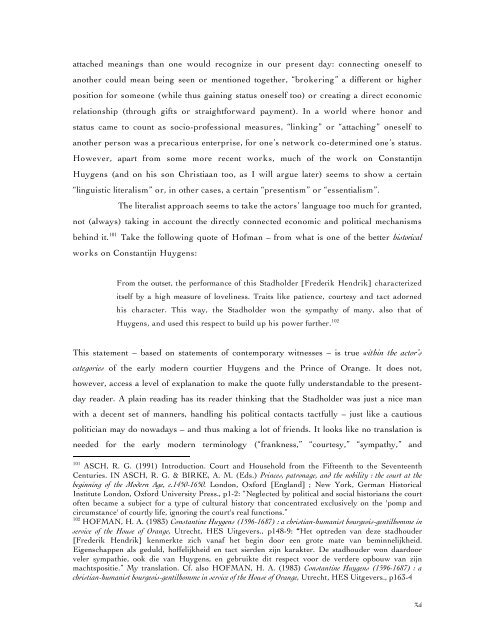Christiaan Huygens – A family affair - Proeven van Vroeger
Christiaan Huygens – A family affair - Proeven van Vroeger
Christiaan Huygens – A family affair - Proeven van Vroeger
You also want an ePaper? Increase the reach of your titles
YUMPU automatically turns print PDFs into web optimized ePapers that Google loves.
attached meanings than one would recognize in our present day: connecting oneself to<br />
another could mean being seen or mentioned together, “brokering” a different or higher<br />
position for someone (while thus gaining status oneself too) or creating a direct economic<br />
relationship (through gifts or straightforward payment). In a world where honor and<br />
status came to count as socio-professional measures, “linking” or “attaching” oneself to<br />
another person was a precarious enterprise, for one’s network co-determined one’s status.<br />
However, apart from some more recent works, much of the work on Constantijn<br />
<strong>Huygens</strong> (and on his son <strong>Christiaan</strong> too, as I will argue later) seems to show a certain<br />
“linguistic literalism” or, in other cases, a certain “presentism” or “essentialism”.<br />
The literalist approach seems to take the actors’ language too much for granted,<br />
not (always) taking in account the directly connected economic and political mechanisms<br />
behind it. 101 Take the following quote of Hofman <strong>–</strong> from what is one of the better historical<br />
works on Constantijn <strong>Huygens</strong>:<br />
From the outset, the performance of this Stadholder [Frederik Hendrik] characterized<br />
itself by a high measure of loveliness. Traits like patience, courtesy and tact adorned<br />
his character. This way, the Stadholder won the sympathy of many, also that of<br />
<strong>Huygens</strong>, and used this respect to build up his power further. 102<br />
This statement <strong>–</strong> based on statements of contemporary witnesses <strong>–</strong> is true within the actor’s<br />
categories of the early modern courtier <strong>Huygens</strong> and the Prince of Orange. It does not,<br />
however, access a level of explanation to make the quote fully understandable to the present-<br />
day reader. A plain reading has its reader thinking that the Stadholder was just a nice man<br />
with a decent set of manners, handling his political contacts tactfully <strong>–</strong> just like a cautious<br />
politician may do nowadays <strong>–</strong> and thus making a lot of friends. It looks like no translation is<br />
needed for the early modern terminology (“frankness,” “courtesy,” “sympathy,” and<br />
101 ASCH, R. G. (1991) Introduction. Court and Household from the Fifteenth to the Seventeenth<br />
Centuries. IN ASCH, R. G. & BIRKE, A. M. (Eds.) Princes, patronage, and the nobility : the court at the<br />
beginning of the Modern Age, c.1450-1650. London, Oxford [England] ; New York, German Historical<br />
Institute London, Oxford University Press., p1-2: “Neglected by political and social historians the court<br />
often became a subject for a type of cultural history that concentrated exclusively on the 'pomp and<br />
circumstance' of courtly life, ignoring the court's real functions.”<br />
102 HOFMAN, H. A. (1983) Constantine <strong>Huygens</strong> (1596-1687) : a christian-humanist bourgeois-gentilhomme in<br />
service of the House of Orange, Utrecht, HES Uitgevers., p148-9: “Het optreden <strong>van</strong> deze stadhouder<br />
[Frederik Hendrik] kenmerkte zich <strong>van</strong>af het begin door een grote mate <strong>van</strong> beminnelijkheid.<br />
Eigenschappen als geduld, hoffelijkheid en tact sierden zijn karakter. De stadhouder won daardoor<br />
veler sympathie, ook die <strong>van</strong> <strong>Huygens</strong>, en gebruikte dit respect voor de verdere opbouw <strong>van</strong> zijn<br />
machtspositie.” My translation. Cf. also HOFMAN, H. A. (1983) Constantine <strong>Huygens</strong> (1596-1687) : a<br />
christian-humanist bourgeois-gentilhomme in service of the House of Orange, Utrecht, HES Uitgevers., p163-4<br />
34


